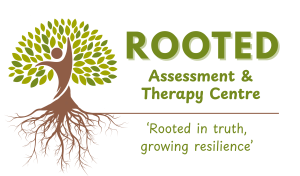About Rooted
At Rooted, we offer specialised therapeutic and assessment services for children, adolescents, and families. We believe in nurturing healing from the ground up — helping our clients feel safe, heard, and empowered. Our team of qualified professionals provides trauma-informed, attachment-focused care tailored to individual needs.

Meet the Team
At Rooted, our strength lies in the compassion, expertise, and dedication of our multidisciplinary team. Each member brings a unique blend of clinical experience, specialised training, and heartfelt commitment to supporting children, adolescents, and families through their healing journey.
The Rooted Assessment and Therapy Center prides itself on combining evidence-based techniques with a compassionate approach to empower children and families on their healing journey.
To make an appointment with one of our social workers, or request more information about the services we render, send an email to admin@rootedcare.co.za

Nomfezeko Mbali
Social Worker

Rachelle Snyman
Social Worker

Elizabeth Matlala
Social Worker

Anél Myburgh
Social Worker

Ezti Boonzaaier
Centre Manager

Dr Bernie Dalgety
Social Worker

Anli Bedeker
Social Worker

Deserey Joubert
Administration

Illana Karam
Social Worker
What makes our centre unique?
Assessment Services
Therapeutic Services
- Structured Trauma Therapy
- Individual Professional Consultations
- Divorce Counselling for Children
- Working with children who are victims of sexual assault
- Attachment Therapy / Therapeutic Parenting
- Parental Guidance
- Emotional Regulation and Social Skills Training
- Support for any other Psycho-Social Difficulties
Psycho-Legal Services
5 Points that make us different.
- In-House protocol on assessment in Psycho-Legal matters
- Full transparency in all we do
- Regular individual supervision and in-house group supervision sessions
- External experts give input on cases to ensure work of the highest standard
- External private audits of our Psycho-Legal cases by experts in the field
Resources
Abstract:
Forensic assessments in cases of alleged sexual abuse is a specialized field of work for which few private practitioners, nor those working at welfare organizations, are equipped. Parents and significant adults in children’s lives are often under the misconception that any therapist, social worker and/or psychologist can do these type of assessments – which jeopardize successful prosecution and results in re-assessment of children and secondary trauma for both the child and parents involved. This document will provide you with a brief overview of forensic practice and highlight some important questions you might never have thought of asking.Introduction:
Forensic assessments in cases of alleged sexual abuse is a specialized field of work for which few private practitioners, nor those working at welfare organizations, are equipped. Parents and significant adults in children’s lives are often under the misconception that any therapist, social worker and/or psychologist can do these type of assessments – which jeopardize successful prosecution and results in re-assessment of children and secondary trauma for both the child and parents involved.Authors
Louise P Aucamp (See resource list)Social worker in private practice
Email: louise@factnetwork.co.za
Download Now
Abstract:
This article examines the various tactics that alienating parents employs as well as the effects of parental alienation on children. The article underscores the importance of addressing parental alienation through a multi-faceted approach, involving legal, therapeutic, and educational interventions. Court intervention may be necessary to modify custody arrangements and protect the child's well-being. At the end of the day the paramount consideration is the child's safety, well-being, and development.Introduction:
Parental alienation is a process by which one parent negatively influences a child’s opinion of the other parent. In the process of parental alienation, one parent (the alienating parent) damages how the child views the other parent (the targeted parent). As a result, the child becomes extremely dedicated to the alienating parent while unjustly demeaning the alienated parent (Baker, 2020, Harman et al. 2019 & Kruk, 2018.). Therefore, in the parental alienation process, an alienating parent tries to exert control over the child's life by instilling animosity between the child and the targeted parent, with the goal of creating a negative relationship between them. The difference between a child who is estranged or has a difficult relationship with his or her parent and an alienated parent is that an alienated child rejects and does not see any good attributes of the target parent whereas she/he does not see or highlight the negative attributes of the favored parent (Kruk, 2018). This results in the targeted parent being seen in a completely negative light while the favored parent is seen as perfect.
Authors
Nomfezeko MbaliSocial worker in private practice
Email:
Download Now
Abstract:
Parents and professionals are often knowledgeable about the different developmental phases of their child, but when it comes to normal sexual development, they tend to avoid the reality of this phase of development. Understanding the normal sexual development of children aids parents and professionals not only in facilitating the development of a healthy sexual identity with children, but also in identifying high risk or concerning sexual behavior. This article provides an overview of normal sexual developmental behavior as well as sexual behavior during childhood that raises a concern.
Authors
Adapted Louise P Aucamp (See resource list)Social worker in private practice
Email: louise@factnetwork.co.za
Download Now
Abstract:
The issue of obtaining consent, from both parents, is often a difficult one for private practitioners and organizations who’s focus is service delivery in the best interest of children. Therapist, social worker’s and psychologist stance is often one of wanting to help and they find it difficult when issues like consent stand in their way of fulfilling this role. In this article the issue of consent is unpacked and ethically and legally sound guidelines is offered to ensure high standard of ethical practice.Introduction:
The issue of obtaining consent, from both parents, is often a difficult one for private practitioners and organizations who’s focus is service delivery in the best interest of children. Therapist, social workers and psychologist stance is often one of wanting to help and they find it difficult when issues like consent stand in their way of fulfilling this role. However, if we want to offer services (even if this excludes any statutory or forensic services) that meets both the legal and ethical requirements, we must in all matters concerning a child follow a transparent process.
Authors
Louise P AucampSocial worker in private practice
Email: louise@factnetwork.co.za
Marie M Steyn
Division Social Work, Potchefstroom Campus of the North-West University, Potchefstroom
Email: Marie.Steyn@nwu.ac.za
Esmé van Rensburg
Division Psychology, Potchefstroom Campus of the North-West University, Potchefstroom
Email: esmé.vanrensburg@nwu.ac.za





